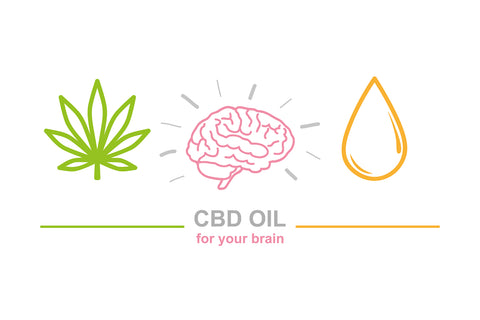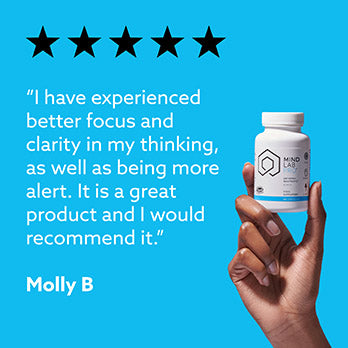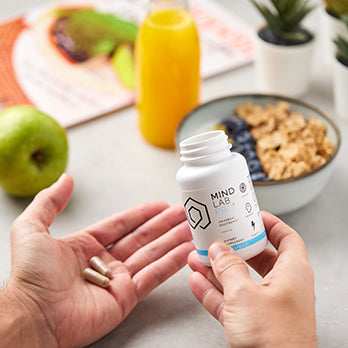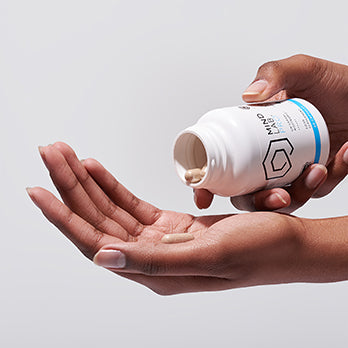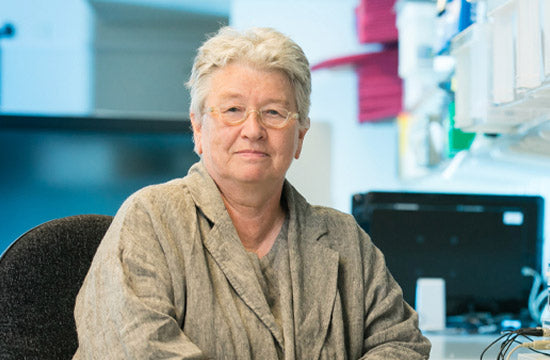Chances are you’ve recently heard about CBD oil.
This safe, natural compound is used to help with everything from anxiety to exercise recovery.
CBD has been steadily growing in popularity thanks to its many health benefits.
But what is CBD exactly?
Is it safe?
Does it help boost mental performance?
Read on to find out about the nootropic benefits of CBD and how you can combine it with other nootropics.
What is CBD?
Cannabidiol (CBD) is one of more than 60 cannabinoids found in the Cannabis sativa plant.
These compounds are responsible for the many health benefits of cannabis.
Most of us are familiar with tetrahydrocannabinol (THC) – the cannabinoid responsible for making you feel high when smoking cannabis.
Difference between CBD and Tetrahydrocannabinol (THC)
After THC, CBD is the second-most abundant cannabinoid.
Although both CBD and THC have similar health and wellness benefits, there is one major difference.
Unlike THC, CBD does not have any psychoactive effects. In other words, CBD does not get you high.
In fact, even it counteracts the psychoactivity of THC. This makes it ideal for reaping the health benefits of cannabis without any of the intoxication (and legal concerns).
CBD and its various uses
CBD is used for a wide variety of conditions and symptoms, including anxiety, stress, insomnia, depression, and chronic pain, among many other challenging disorders.
It may even have potential to help with digestive disorders such as inflammatory bowel issues (IBD), blood sugar problems, cardiovascular conditions, and headaches.
Given this wide range of health potential, it's no surprise interest in CBD has skyrocketed over the past several years.
Is CBD Safe?
Alongside its lack of psychoactive effects, another key characteristic of CBD is its remarkable safety.
To date, research has not reported any significant side effects with doses as high as 1500 mg per day.
However, CBD may cause minor side effects such as sleepiness, lightheadedness, and dry mouth in some people.
Is CBD Legal?
As it stands, CBD is perfectly legal in the United States if it is produced from hemp - cannabis plants with 0.3% or less THC.
Hemp plants do not contain enough THC to make you high, and hemp was made legal in the U.S. with the passing of the 2018 Farm Bill.
On the other hand, CBD derived from marijuana - cannabis plants with more than 0.3% THC - is still considered illegal in most states.
In the rest of the world, the legal status of CBD remains a contentious issue despite the fact that it does not share the intoxicating effects of THC and whole cannabis.
More on Nootropic Legality around the world
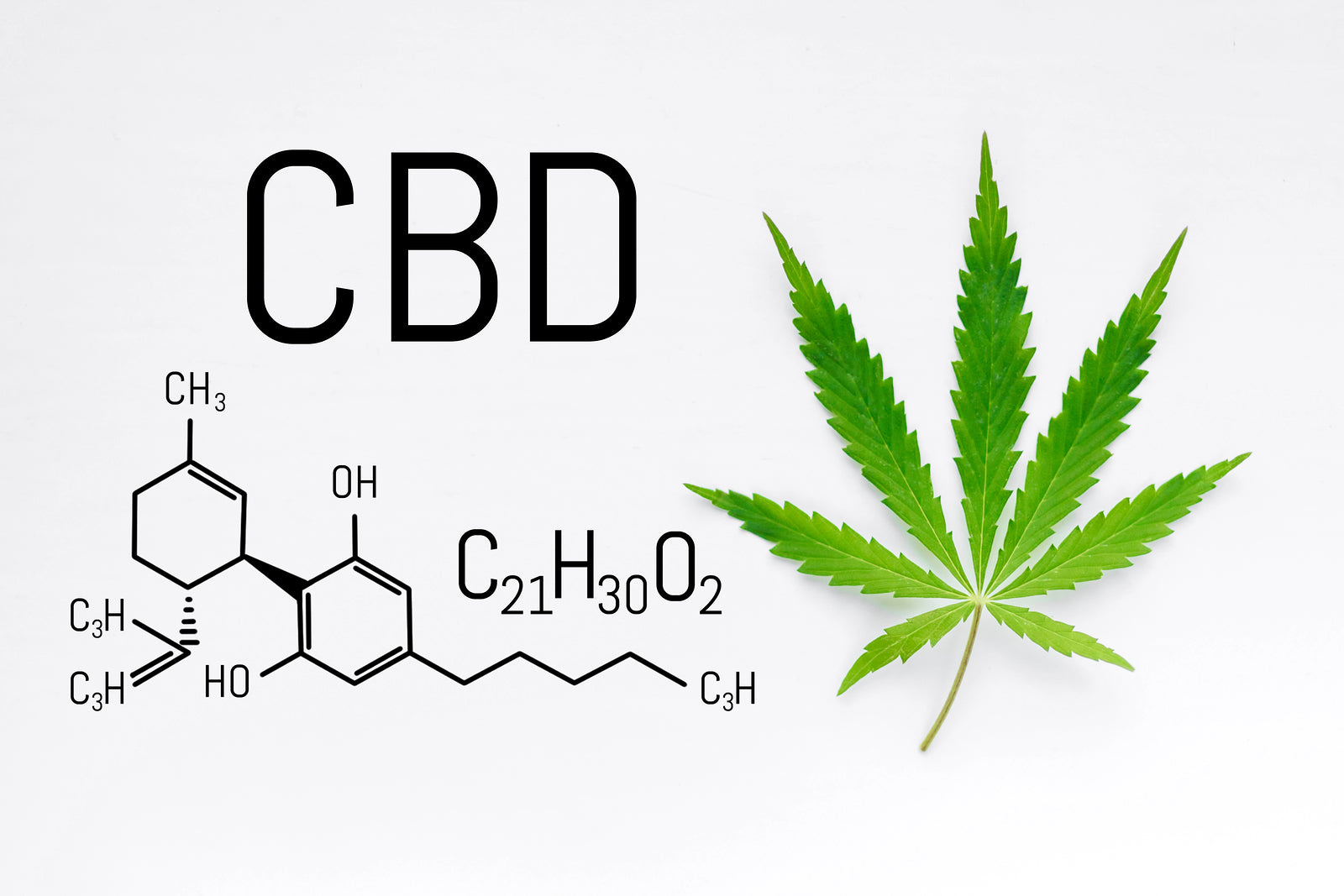
CBD Nootropic Benefits
As noted above, CBD possesses a wide range of health benefits.
Many of these benefits are related to cognitive performance, making CBD an excellent nootropic compound.
In particular, it has been demonstrated to protect brain cells, and help with anxiety, depression, stress, sleep, and addiction.
This means CBD works best as a way to maximize your brainpower by mitigating the negative effects of other problems - such as anxiety - rather than boosting your mental processing beyond its natural potential.
Another ingredient that comes in "oil" form is Medium-chain Triglycerides; similar to CBD, there has been a rise in entrepreneurs, college students, and more, testing its cognitive benefit.
Anxiety
The most popular reason people use CBD is to alleviate anxiety.
Researchers are rightfully enthusiastic about CBD’s potential to help with everything from mild anxiety to panic attacks and disorders such as generalized anxiety disorder (GAD), obsessive-compulsive disorder (OCD), and even post-traumatic stress disorder (PTSD).
CBD’s anxiety-relieving effects are supported by multiple research studies.
For example, one study in individuals with social anxiety disorder (SAD) demonstrated that CBD significantly reduced anxiety caused by public speaking.<1>
In addition, CBD is known to counteract the anxiety produced by THC, its psychoactive cousin.
Depression
Alongside anxiety, depression is the leading mental health challenge of our time.
Indeed, these two disorders often go hand-in-hand.
An increasing number of people are now turning to CBD as an alternative option for helping with depression and related mood issues such as lack of motivation.
Although research in this area has only just begun, studies in rodents suggest that CBD may have beneficial effects for depression.
Stress
Stress is another common health concern where CBD can be helpful.
This is not surprising when we consider the interplay between stress, anxiety, and depression, which can cause or worsen one another.
In particular, research shows CBD can help us deal with stress by affecting brain systems involved in stress regulation and responses.<2>
Sleep
We've all experienced how sleeping just a few hours less can negatively impact our cognitive performance for the whole day.
Indeed, sleep is perhaps the single most important process for maintaining peak brainpower.
Although CBD is not a sleep aid per se, it is widely known that anxiety, stress, and depression contribute to insomnia and other sleep problems.
This means CBD can enhance sleep quality in individuals prone to these issues.
Neuroprotection
Another less-discussed nootropic benefit of CBD is neuroprotection – the protection of neurons (brain cells) from damage.
Neuroprotective compounds not only defend against the natural, age-related decline in cognitive function but also neurodegenerative conditions.
So far, studies in animals have shown that CBD may protect neurons from degeneration through antioxidant activity and other effects.
This benefit is of particular significance to older adults.
More on neuroprotective nootropics
Addiction
Last but not least, another promising use for CBD is to help with substance addiction.
Early animal and clinical studies show that CBD can help reduce the cravings for opioids, cocaine, psychostimulants, cannabis, tobacco, and potentially even alcohol.
More on nootropics for nicotine addiction
How CBD may Help With Brain Health and Mental Performance

Since research on CBD is still in its early stages, medical experts are not yet entirely sure how it works.
Having said that, most research evidence suggests CBD's nootropic benefits are the result of two main mechanisms: interacting with body’s endocannabinoid system, and affecting other parts of the brain and central nervous system.
CBD and the Endocannabinoid System
The endocannabinoid (ECS) system contains receptors that are activated by cannabinoids.
A simple way to think about this is to imagine receptors as locks and the cannabinoids as keys that fit into these locks and activate an effect.
This system appears to regulate a wide range of processes, including:
- Appetite, digestion, and metabolism
- Immune system function and inflammation
- Anxiety, mood, fear, and stress
- Memory and learning
- Pain
- Sleep
Although the ECS was discovered as a result of researching the effects of cannabis-derived "phyto" cannabinoids, it turns out that the human body produces two of its own "endo" cannabinoids - 2-AG and anandamide.
Interestingly, research shows that CBD does not strongly interact with the two known ECS receptors - CB1 and CB2.
However, it does interact with other unidentified receptors that may be part of the ECS.<3>
In addition, CBD can affect the ECS indirectly by reducing the breakdown of anandamide.<4>
Other Effects of CBD on the Brain
In addition to interacting with the ECS, research suggests CBD interacts with the brain in other ways.
For example, it has been shown to interact with the serotonin receptor, which regulates mood, stress, anxiety, and other cognitive key processes.<5>
It has also been shown to affect opioid receptors that are involved in regulating pain.<6>
Ways to take CBD
Unlike many other nootropics and natural health supplements, CBD can be taken in a variety of forms.
Although CBD oil is far and away the most popular form, CBD also comes in capsules, vape e-liquid, edibles, creams, sprays, and more.
Generally speaking, these can be divided into four major routes of administration: sublingual, oral, inhaled, and topical.
Sublingual CBD (Oil)
The most popular way to take CBD is to put a few drops of CBD oil under the tongue.
This method has the advantages of good absorption, relatively fast effects, and easy administration.
Oral CBD (Capsules & Edibles)
Like most supplements, CBD can also be taken in the form of capsules.
Although this form is great for ease of use and tends to last the longest, it does suffer from poor absorption.
In addition, CBD can also be infused into edibles ranging from gummy bears to cookies.
Inhaled CBD (Vaping)
The third major method of taking CBD is to vaporize and inhale it with a vape pen.
This route provides quick relief thanks to the rapid absorption of CBD in the lungs.
However, it also lasts the shortest amount of time, and health experts are still not entirely sure about how safe vaping is.
Topical CBD (Creams)
Finally, CBD can even be applied to your skin as part of a cream or other topical solution.
This method is ideal for dealing with localized concerns such as muscle pain or acne.
Full Spectrum vs CBD Isolate
Another way CBD products can differ is whether they are isolate or full spectrum. A CBD isolate product contains nothing but pure CBD.
On the other hand, full spectrum or whole plant CBD products contain not just CBD, but also other natural cannabis compounds such as terpenes, flavonoids, and other minor cannabinoids such as cannabichromene (CBC) and cannabigerol (CBG).
These compounds have health benefits of their own and also work in synergy with CBD in what researchers call the "entourage effect."
This effect appears to make whole plant CBD products more effective than CBD isolate.
CBD Dosage
When it comes to CBD, one of the most confusing topics is dosage.
More specifically, there are two key questions: how much CBD is in your oil product (concentration), and how much you should take for your particular case.
CBD Concentration
To figure out how much CBD is in your oil product, find the total CBD or cannabinoid content and the volume of the bottle.
For example, your 25 ml tincture may have 500 mg CBD total.
Next, you will want to divide this total by the bottle volume (500/25), which in our example results in 20 mg.
This means 1 ml of your CBD oil contains 20 mg of CBD. Most droppers have a volume of 1 ml when they are full and contain a total of 20 drops.
This means we can divide our 20 mg by 20 - the number of drops. In our case, one drop of oil contains 1 mg of CBD.
CBD Nootropic Dosage
It is difficult to give an exact CBD nootropic dosage because of many variables such as:
- What you're taking CBD for
- Your body weight
- The form of CBD
As a general rule of thumb, you should start with very low doses such as 5 mg and increase until you experience the desired effects. For nootropic uses, the vast majority of people use 15-50 mg doses of CBD in oil form.
Mind Lab Pro® Universal Nootropic Stack for Pairing with CBD
Mind Lab Pro® is the world’s first Universal Nootropic™.
Containing only tried-and-tested natural nootropic ingredients, it's the perfect paring with your CBD.
Although CBD is already great on its own, it can also be paired with other nootropics for improved effectiveness. This practice of using different compounds together – known as stacking – is popular in the nootropic user community.
CBD is particularly great as a combination nootropic because it is reliable, produces no major side effects, and seems to remain effective even over prolonged periods of daily use.
Below we will describe how some of the nootropics found in Mind Lab Pro® can be combined with CBD to further enhance its cognitive benefits.
Here are the Ingredients in Mind Lab Pro®:
L-Theanine
Alongside caffeine, L-theanine is arguably the most reliable nootropic out there. This amino acid is largely responsible for the calm, focus, and creativity associated with tea consumption. L-Theanine's calming properties are backed by decades of research and thousands of years of use across the world.
For example, one highly-cited study demonstrated that L-theanine helps people stay relaxed when faced with a stressful arithmetic task.<7> In addition, research has also shown that L-theanine can be an effective sleep aid.
Having said that, L-theanine's effects are relatively minor. As such, combining L-theanine with CBD makes for an excellent anti-anxiety, sleep-enhancing stack. Another advantage of this combination is that both compounds have virtually no side effects and remain effective even over prolonged periods of use.
More on Mind Lab Pro® L-Theanine
Lion’s Mane
Lion’s Mane is a nootropic mushroom unique for stimulating production of Nerve Growth Factor (NGF), a molecule that promotes brain cell regeneration. Thanks to this effect, Lion’s Mane can help keep the brain healthy and protect it against age-related cognitive issues.
- One study in elderly Japanese men and women suffering from mild cognitive impairment demonstrated improved cognitive function 8, 12, and 16 weeks after taking Lion’s mane.<8>
Considering that CBD also has neuroprotective properties, combining it with Lion’s Mane is an excellent strategy for helping with cognitive decline in older adults.
More on Mind Lab Pro® Lion’s Mane Mushroom
Phosphatidylserine
Phosphatidylserine (PS) is a phospholipid compound abundant in brain cell membranes. Since PS naturally declines as we age, it’s not surprising that multiple studies show it can help with age-related cognitive concerns such as cognitive decline and memory issues.
PS is considered so effective that the FDA backs the claim that it can lower risk of cognitive dysfunction in older adults. As such, PS is another great nootropic to combine with CBD for older adults looking to protect themselves from age-related cognitive dysfunction.
More on Mind Lab Pro® Phosphatidylserine
N-Acetyl L-Tyrosine
Tyrosine is a versatile amino acid involved in producing the key neurotransmitters epinephrine, norepinephrine, and dopamine. These brain chemicals regulate mood, memory, attention, and other processes. Tyrosine helps maintain optimal levels of these neurotransmitters when they become depleted in stressful situations.
Research shows that tyrosine helps sustain peak mental performance during periods of stress, which includes everything from sleep deprivation to psychological stress and fatigue.
One study, for example, demonstrated that taking tyrosine before a combat course helped cadets perform significantly better on cognitive tasks and also reduced their blood pressure – another marker of stress.<9>
Given that many people take CBD to help with the negative effects of stress on cognitive performance, combining it with tyrosine is a great way to improve CBD’s effects. Together, these two compounds can help the body's stress response system function properly.
More on Mind Lab Pro® N-Acetyl L-Tyrosine
Rhodiola Rosea
Rhodiola is a popular adaptogen – a herb that helps the body cope with mental and physical stress. In doing so, it can help sustain peak physical and mental performance during periods of stress, whether it be caused by lack of sleep, physical exhaustion, or other issues.
- One study showed that rhodiola helped people with stress-related fatigue syndrome improve their concentration, mood, and other measures of cognitive performance.<10>
- Another study in stressed individuals demonstrated a “clinically relevant degree” of improvement in stress symptoms.<11>
Similar to tyrosine, rhodiola is a great anti-stress nootropic to use alongside CBD to help sustain peak cognitive performance under taxing conditions.
More on Mind Lab Pro® Rhodiola Rosea
Bacopa Monnieri
Bacopa is an herb used by young and old alike to help enhance learning and sharpen memory. This natural remedy has a good deal of research evidence backing its memory benefits, particularly in older adults suffering from age-related cognitive decline.
- For example, one study in healthy elderly participants found that bacopa “significantly improved memory acquisition and retention.”<12>
Although CBD does not improve memory per se, its neuroprotective properties are a great combination with bacopa for older adults looking to protect themselves from memory decline.
More on Mind Lab Pro® Bacopa Monnieri
Maritime Pine Bark Extract
The maritime pine tree is known for containing powerful proanthocyanidin antioxidants in its bark. These compounds can help protect brain cells from oxidative stress, enhance blood flow to the brain, and promote brain plasticity and regeneration. In turn, these effects have been linked to enhanced memory, attention, mood, and other benefits.
- Specifically, one study of maritime pine bark extract demonstrated “improved working memory” in elderly individuals.<13>
Maritime pine bark extract can be used in combination with CBD to help with age-related cognitive decline.
More on Mind Lab Pro® Pine Bark Extract
Citicoline
Last but not least, citicoline is a compound that enhances brain energy and helps keep neurons healthy by providing the essential nutrient choline. Similar to phosphatidylserine (PS), citicoline can help mitigate the age-related decline in phospholipids that make up brain cell membranes.
- One study showed that older adults taking citicoline daily for 12 weeks experienced a significant increase in brain phospholipid levels, suggesting that “citicoline may be of use in reversing age-related changes in the brain."<14>
- Another study reported improved memory performance in elderly participants with memory complaints.<15>
These benefits make citicoline an effective nootropic to pair with CBD for older adults. In addition, medical experts report that citicoline also has another specialized use – counteracting the psychoactive effects of THC, such as anxiety, paranoia, and brain fog.
If your CBD product happens to have a significant amount of THC and you are concerned about its side effects, then this is one more reason to use citicoline.
More on Mind Lab Pro® Citicoline
Conclusion
Despite its association with cannabis, CBD is a safe, reliable nootropic that does not cause any intoxication.
An increasing number of people across the world are using CBD to help with anxiety, stress, depression, sleep, and other cognitive concerns.
Medical research on CBD is an expanding field, with more and more studies providing evidence for its health and wellness benefits.
Mind Lab Pro® supplies 11 premium research-backed brain-boosters, many of which complement and enhance CBD's nootropic benefits.
One way to enhance the effects of CBD is to combine it with other nootropic compounds.
Mind Lab Pro® includes multiple nootropics that complement CBD's effects on anxiety, stress, sleep, and neuron support for optimal memory and brainpower.
References
- Bergamaschi MM et al. Cannabidiol reduces the anxiety induced by simulated public speaking in treatment-naïve social phobia patients. Neuropsychopharmacology. 2011 May; 36 (6): 1219-26.
- Crippa JA et al. Neural basis of anxiolytic effects of cannabidiol (CBD) in generalized social anxiety disorder: a preliminary report. J Psychopharmacol. 2011 Jan;25(1):121-30.
- Booz GW. Cannabidiol as an Emergent Therapeutic Strategy for Lessening the Impact of Inflammation on Oxidative Stress. Free Radic Biol Med. 2011 Sep 1;51(5):1054-61.
- Schuelert N and McDougall JJ. The abnormal cannabidiol analogue O-1602 reduces nociception in a rat model of acute arthritis via the putative cannabinoid receptor GPR55. Neurosci Lett. 2011 Aug 1;500(1):72-6.
- Zanelati TV et al. Antidepressant-like effects of cannabidiol in mice: possible involvement of 5-HT1A receptors. Br J Pharmacol. 2010 Jan;159(1):122-8.
- Kathmann M et al. Cannabidiol is an allosteric modulator at mu- and delta-opioid receptors. Naunyn Schmiedebergs Arch Pharmacol. 2006 Feb;372(5):354-61.
- Kimura K et al. L-Theanine reduces psychological and physiological stress responses. Biol Psychol. 2007 Jan;74(1):39-45.
- Mori K et al. Improving effects of the mushroom Yamabushitake (Hericium erinaceus) on mild cognitive impairment: a double-blind placebo-controlled clinical trial. Phytother Res. 2009 Mar;23(3):367-72.
- Deijen J et al. Tyrosine improves cognitive performance and reduces blood pressure in cadets after one week of a combat training course. Brain Res Bull. 1999 Jan 15;48(2):203-9.
- Olsson EM et al. A randomised, double-blind, placebo-controlled, parallel-group study of the standardised extract shr-5 of the roots of Rhodiola rosea in the treatment of subjects with stress-related fatigue. Planta Med. 2009 Feb;75(2):105-12.
- Edwards D et al. Therapeutic effects and safety of Rhodiola rosea extract WS® 1375 in subjects with life-stress symptoms--results of an open-label study. Phytother Res. 2012 Aug;26(8):1220-5.
- Morgan A and Stevens J. Does Bacopa monnieri improve memory performance in older persons? Results of a randomized, placebo-controlled, double-blind trial. J Altern Complement Med. 2010 Jul;16(7):753-9.
- Ryan J et al. An examination of the effects of the antioxidant Pycnogenol on cognitive performance, serum lipid profile, endocrinological and oxidative stress biomarkers in an elderly populationv. J Psychopharmacol. 2008 Jul;22(5):553-62.*
- Babb SM et al. Chronic citicoline increases phosphodiesters in the brains of healthy older subjects: an in vivo phosphorus magnetic resonance spectroscopy study. Psychopharmacology (Berl). 2002 May;161(3):248-54.
- Alvarez XA et al. Citicoline improves memory performance in elderly subjects. Methods Find Exp Clin Pharmacol. 1997 Apr;19(3):201-10.
* Please note that many Pine Bark Extract studies include data and citations which are specific to Pycnogenol®, which is not an ingredient of Mind Lab Pro®.
PLEASE NOTE: Always go with a reputable source and make sure the product is of Hemp origin and THC Free. We are not involved in CBD production and do not endorse or support any brand of CBD products. When taking supplements or any substance, particularly in a combination, it is always important to seek the advice of a doctor. CBD is generally held to be safe but we do not suggest or guarantee that this can be applied to all available CBD products – in some individuals high levels of THC may cause interactions with medications and supplements, with unpredictable side effects.


